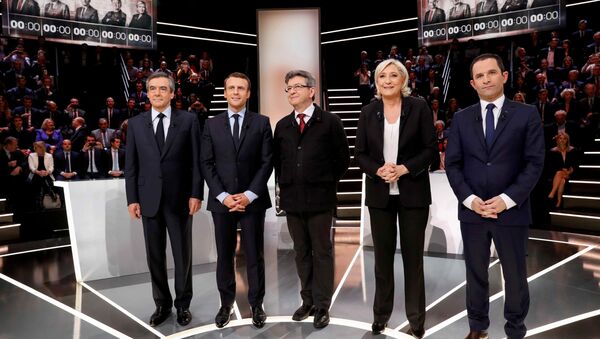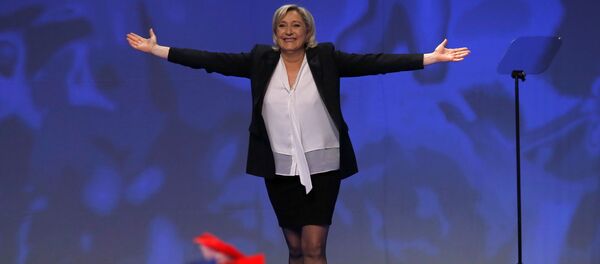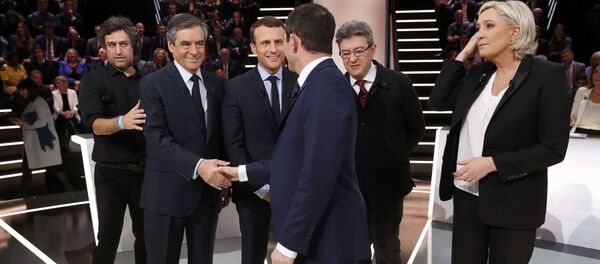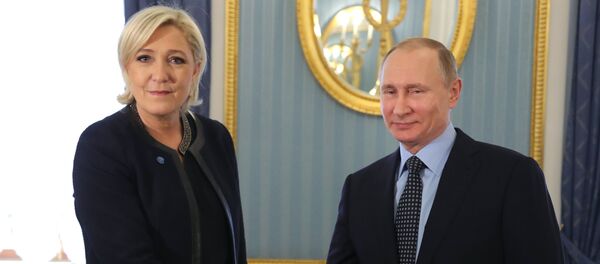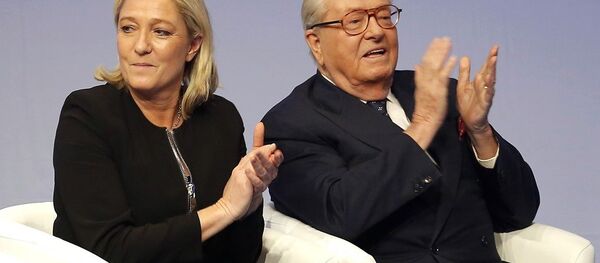MOSCOW (Sputnik) — According to a recent poll, Emmanuel Macron, the former minister of economy turned independent candidate, and far-right National Front (FN) party leader Marine Le Pen are the main contenders in the first round of the French presidential election, with Macron anticipated to win in the second round.
These two are clashing strongly on their approach to the united Europe and migration.
"Macron’s bet is to rally all those people who want to save the eurozone and the European Union. The political dilemma for the presidential election in France is no longer to choose between the right or the left, but a choice between ultra-Europeans for Macron and patriots for Le Pen," member of the European Parliament from France Gilles Lebreton told Sputnik.
Jean-Luc Schaffhauser, a member of the European Parliament's Subcommittee on Security and Defense from France, agreed that the traditional left-right division was obsolete, adding that debates about secularism or immigration, as well as globalization or deregulation, constitute a fundamental divide in modern politics.
"The main rivals today are patriotic forces of Marine Le Pen’s supporters, and globalists, who are behind Macron," Schaffhauser told Sputnik, adding that the FN leader’s opposition to the European Union and the euro does not mean an automatic French withdrawal from the European Union, if she is elected.
According to Le Pen, the euro led to prices growing and purchasing power decreasing and caused the French economy to lose some of its competitiveness. The FN leader said that she was not prepared to cap salaries or limit social security benefits, so she would rather deal with the currency as the means of making the economy more competitive.
"Marine Le Pen does not want to deprive France of the euro without consultations with other countries and without a referendum on a matter in France," Schaffhauser said stressing, however, that the question of a single currency is very important for France "as it is absolutely impossible to carry out economic reforms without monetary sovereignty."
Le Pen also emphasized in her Sunday interview that the talks on currency and Schengen would have to be approved in a referendum first.
"The people will decide whether to stay in or leave he European Union, with a goal of establishing another Europe. Because I actually am European. I believe in Europe, but in a Europe of cooperation… not the Europe that has become totalitarian and that moves forward without or even against the people," Le Pen told the Le Parisien.
The very first item on Le Pen's presidential campaign is about negotiations with European partners "followed by a referendum on [France's] membership of the European Union," while item 24 suggests re-establishing national borders and leaving the Schengen agreement on free movement, which is one of the core principles of the European Union.
Macron's program states that the free movement of people is "a reality, with undeniable benefits in terms of economy, but also in terms of culture and education." The former economy minister stresses that the euro "gave France back the ability to influence the decisions on the European monetary policy."
Le Pen's approach seems in sync with the growing anti-globalism trend, which manifested itself in the United States and the United Kingdom in 2016.
The United Kingdom's decision to leave the European Union and the victory of Donald Trump in the US presidential election in 2016 were seen as big victories for the anti-establishment and anti-globalist movement. Trump is seen as less than enthusiastic about global free trade agreements and willing to implement restrictions on migrants and refugees that come to the United States. Immigration and tighter border controls played important part in the United Kingdom's decision to leave the bloc.
This new political divide in France is being closely followed in the media across the world as the future of the European Union and the global interest in free-trade deals may depend on who becomes the next French president. The bloc depends strongly on the continued collaboration between France and Germany, especially following Brexit.
Le Pen, who is relying on an anti-EU, anti-migration and free-trade skeptical platform, has very good chances of winning despite pollsters' prognoses, Gilles Lebreton stated.
"I think Marine Le Pen has a 50-percent chance of winning the election. Polls deliberately diminish her popularity and should be analyzed with certain mistrust," he said.
Le Pen could thus repeat the success of Trump, whose victory, doubted by most polls, came as a stunning surprise to his opponents.
At the rally in Lyon on February 5, presidential hopeful Le Pen said that "the collapse of traditional parties and the systematic disappearance of almost all of their leaders showed that a great political re-composition has begun" adding that this divide is no longer "between the left and the right, but between patriots and globalists."
The tug-of-war between the two latter forces became evident during the first French presidential TV debates on March 20.
Macron offered the French increased European integration and federalism, the further promotion of multiculturalism within the French society and closer cooperation with Germany.
The independent candidate clashed vigorously with Le Pen, who accused him of being in favor of burkinis as a symbol of multiculturalism. Burkini is a full-body swimsuit worn by Muslim women on the beach, which were locally banned by several mayors in France last summer.
"The burkini is a public order problem. Do not use it to divide the French," Macron said, pointing out that Le Pen’s ideas to ban burkinis are dangerous because of potentially transforming "the over four million French people whose religion is Islam… into enemies of the Republic."
The confrontation also spilled out onto France’s foreign policy questions.
Macron noted that France should not move closer to Russia and needed more independence in its foreign policy.
"We have a long history with the United States. Together we have been building peace on the planet … I would not build my independence by moving closer to [Russian President Vladimir] Putin, but through more of the European responsibility," Macron said during the last TV debate.
Le Pen, for her part, repeatedly stressed her opposition to the European Union and her intention to preserve French values and defend France's national sovereignty. The FN leader said that she did not want "to become the vice-chancellor of [German leader] Angela Merkel."
Le Pen remains the only major candidate not to have visited Merkel, given the difference in their opinions on Europe. Meanwhile, Benoit Hamon, the nominee of the Socialist Party, followed example of The Republicans' Francois Fillon and Macron and met Merkel on Tuesday.
The first round of voting in the French presidential election will be held on April 23. If no single candidate wins an absolute majority, the top two winners in the first round will compete in a run-off on May 7.

